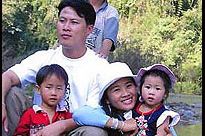This eco-tourism leader was abducted in broad daylight. Still no word on his condition or whereabouts.
Vientiane - Laos Peoples Democratic Republic
There has been a lot of whispered conversation about Sompawn Khantisouk. Everybody I know who has ever worked with Pawn or befriended his family says the same thing. They all hope that, despite the dwindling odds, he will turn up alive.
The Boat-Landing Lodge, the eco-tourism resort in Luang Namtha Province that Pawn owns and manages, has been praised by the Lonely Planet and other travel guides to Southeast Asia. Most travelers familiar with northern Laos consider the Boat-Landing a flagship enterprise, clearly the regional leader in promoting ecologically sensitive tourism.
Pawn and Bill Tuffin, his American business partner, have built a solid reputation among an ever-widening community of travelers questing after “green adventure.” Their resort consists of a restaurant and several bungalows built entirely of locally available materials that nestle harmoniously among towering trees in a peaceful, riverside setting. The resort eschews non-recyclables and minimizes consumption of water, dry plant material and firewood. It’s a cozy place that leaves just a tiny carbon footprint. I’ve been a guest at the resort myself and can attest to the beauty of the lodge and the serenity of its location.
The resort’s knowledgeable staff offers guests entree into the wilds of northern Laos, through activities such as trekking, rock climbing, mountain biking, rafting and kayaking. Luang Namtha Province, once renowned mostly for its opium dens, has slowly transformed its reputation into a locale where visitors can find wholesome recreation or adventure.
For Pawn and Bill, promoting eco-tourism became one with encouraging respect for the natural environment of the province. It goes without saying that travelers attracted to a place like the Boat-Landing want to see triple canopy forest, not rubber tree plantations; they want to return home with memories of clean, wild rivers, not streams choked with mining silt.
About a year ago, Pawn was snatched up by several men, hustled into a waiting car, and driven away. Since that day no one has seen or heard from Pawn and only his abductors know his fate. His American business partner departed Laos soon after Pawn’s disappearance and has not returned.
No one knows for certain who had Pawn abducted. Some think it was economic interests that conflicted with eco-tourism. Those people think hired thugs did the job. Others think his abduction had official sanction; they even say that witnesses to the abduction recognized local police officers.
Old hands here in Lao who pride themselves on being able to interpret events usually sum up Pawn’s plight in a single word: “Re-education”, implying that he now probably languishes in the Lao Gulag, doing hard labor on scant provisions, serving an indeterminate sentence handed down without benefit of trial.
Ironically, the kind of tourism that the Boat Landing promotes was supposed to have official support and encouragement. The Lao government is on record as identifying “eco-tourism” as one of five major development priorities, the others being hydroelectric power, construction materials, agriculture, and mining (strange bedfellows for green tourism but then, I didn’t create the list; the Lao government did).
Pawn’s father, wife and children still depend upon the resort for their living, as do local villagers who work at the lodge or guide activities. The family has managed to keep the place up and running. Thankfully, guide books still taut the Boat Landing resort as a peaceful retreat and encourage travelers to visit; most guest arrive with no knowledge of the tragic events that have befallen Pawn, Bill, and the people they left behind.
I wonder about the fate of environmentally sensitive tourism in Laos if the people who lead that movement are made to live in fear that their efforts might bring down the wrath of competing economic interests. How can it happen that a star in the field of eco-tourism, lauded not only by visitors but by the Lao government itself, can be made to suffer such hardship? And finally, the most immediate question: “Where is Sompawn Khantisouk?”

